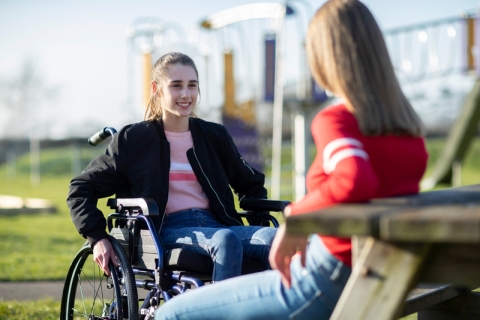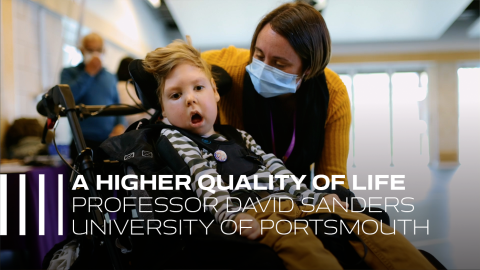

Research led by David Sanders has contributed to a higher quality of life for over 2,000 children and young people with disabilities in the UK by improving their mobility.
The Challenge
Children with disabilities often struggle with a lack of independence, finding themselves struggling to communicate or to control their own movement. This can have a huge psychological and emotional impact on children who are cognitively able.
What did we do?
David Sanders and his team developed a system that mounts onto powered wheelchairs, allowing any wheelchair to become an intelligent powered mobility device. The technology uses a Raspberry Pi computer which responds to vocal cues from the user, allowing them to independently control the movement of their wheelchair.
The Impact
Over 2,000 children and young people with disabilities are experiencing a higher quality of life as they are able to control their own movement around their space and exercise an increased level of independence.
Healthcare costs have reduced as cheaper designs have been developed, such as reducing the costs of scanning collision avoidance. Professional standards and practices have also changed in response to this innovation, as powered wheelchairs have become an option for a broader range of individuals.
A higher quality of life

Bertie is an incredible 8-year-old boy who loves Harry Potter, David Attenborough, he's really caring to his friends and his family and he has lots of complex needs.
0:17
Bertie is an amazing little chap.
0:20
He's very intelligent and one of the biggest things we're proud of, actually, Heritage is spotting what's in there and bringing it out.
0:30
For Bertie, the most difficult challenge he faces is his independence.
0:35
He has so many things done for him because of his physical, medical needs that we are always looking for different ways in which he can be independent.
0:45
Those who have undiscovered intelligence go through so much frustration and depression.
0:52
Once we have discovered that a young person is cognitively able and does have understanding, technology can play a huge part.
1:01
Any technology that can help us towards that independence and communication increases the happiness levels.
1:13
So far, we've built systems that mount themselves onto powered wheelchairs.
1:18
And the reality is kids and disabled people will tend to have wheelchairs that they are used to.
1:27
And so we're creating new platforms now where you can put any wheelchair onto a platform, and then that platform becomes the intelligent powered mobility device.
1:42
For Bertie, he's really always wanted to have more than one way of moving.
1:45
He's wants to be able to turn and move forwards, and with his restricted mobility, we haven't really found a way of doing that up until now.
1:51
With the project, with the University of Portsmouth, we've been able to use a Raspberry Pi computer, which stores Bertie's voice.
1:59
And it means that when Bertie Vocalises he's able to move the platform a certain distance.
2:03
That then will give him the option over time to be able to move forwards and turn using his head switch at the same time.
2:10
The system continuously listens to a specific frequency in Bertie's voice.
2:16
Once Bertie produces or generates that voice, the system can identify it and an intelligent programme can interpret it
2:21
into a driving command to operate the powered mobility platform.
2:31
The avoidance system works as it has two different modes where you can stop when an obstacle is detected or avoid which moves away from the obstacle if it's detected.
2:39
The systems benefit the user because they are intelligent systems and they continuously learn about the user's pattern,
2:45
about the driving ability and improve their driving experience.
2:50
When Bertie first used his voice on the platform, I was stood right next to him and he used and it turned towards me and made me jump.
3:01
Bertie thought it was very funny because he nearly ran over his teacher
3:04
and for me it was just really exciting seeing his eyes light up and him knowing that he had done that himself.
3:25
For me it's been very valuable being in partnership with an organisation that is on a similar wavelength.
3:31
It's coming up with something different.
3:34
In other words, having more minds on a problem can look at it from different angles and perspectives.
3:39
It's important for us to have partnerships because to make these things work and make them useful, we all the time have to be having people try them out.
3:48
The excitement when I last saw him driving with with his voice is just wonderful.
3:55
And it takes him so much effort to produce that vocalisation.
3:59
So you can tell how much he's loving it because he's really given it his all.
4:04
For me, to see the systems are being used is just great.
4:08
Just amazing.
4:09
You cannot put a price tag on that.
4:13
Children and young people with complex needs often present we've learned helplessness.
4:18
So learned helplessness is where a child or young person with complex needs switches off from their learning or from their lives
4:27
because so many things are done to them or done for them that they feel like they don't have a voice.
4:33
One of the things we try and focus on in this research is about ability rather than disability.
4:41
So we're looking at trying to enhance their lives by looking at what they can do and then expanding on that and enabling them to do more.
4:50
They're very unique, special people that have a spark of something that we're trying to capture, make use of.
4:58
And parts of my role, I feel, is to try to capture that spark and enable it for them.
5:03
We've got lots of creative ideas of where to take take this.
5:06
What we'd like to do is for the wheelchair system to be able to identify the children and then configure itself.
5:13
This could have global impacts for anyone with disabilities.
5:17
Bertie with the right tech, who knows how far we'll be able to take him.
5:23
It's really exciting to be part of this.
5:26
It gives me more knowledge and experience of what different technology can do that I can then implement with other children, young people across the foundation.
5:37
We've chosen to apply ourselves to this area because of that real change that we see in people, that real improvement in their quality of life
5:48
that might be possible as kids do things for the first time that they've just never been able to do before.
5:55
If you can enable more autonomy and choice-making, independence for disabled people, then we're proud to be part of helping that move forward.
6:09
I love engineering and I love research, but actually applying that in a meaningful way,
6:14
which has an impact on human beings and their lives and their quality of life, is very rewarding.
6:21
The project at the University of Portsmouth supports our ethos.
6:24
It will help change lives effectively.
6:27
It will help those young people that have very complex needs be able to be as independent as possible.
